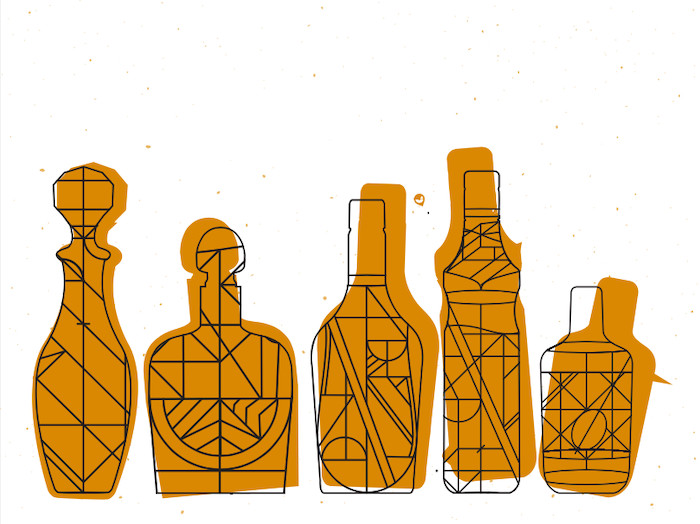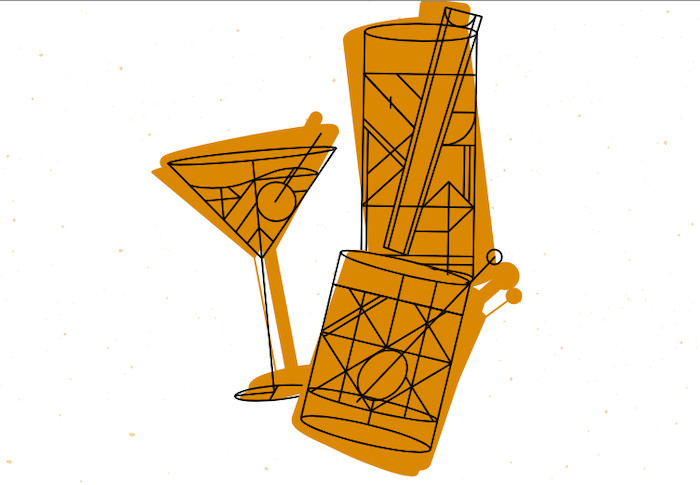
Shouldn't the best bars use the best spirits, asks Hamish smith.
You’re standing in front of a row of spirits, ruminating over your selection. It’s familiar fare - there’s Bacardi and Havana Club, Grey Goose and Absolut, Beefeater and Tanqueray and Johnnie Walker. The question is, where are you standing? At a top cocktail bar or in a supermarket isle? This is not a riddle, but only because there’s not a smart answer. You could be in either.
The dominance of mainstream brands in the best of our bars has become so normalised we barely even question it. We have accepted that you can buy Barcardi Carta Blanca for £15 a shot at a world-famous hotel bar and also £15 a bottle at Asda. We have become attached to the idea that household brands are socially mobile, appropriate to every setting. But have you ever felt that, at the price you’re paying, the drink could be better?
The deal inside the deal
Around the time I first started writing about drinks, I was buying a flat in a one of London’s eternally-tomorrow neighbourhoods. As I grappled with the estate agents, it slowly dawned on me that they weren’t working for me the buyer, nor even the seller. They were working for the deal. And the deal alone. And that was a realisation that informed another.
Up to then, I’d naively thought bars served the spirits they thought made the best cocktails and that was the only criterion. Probably, like most of the public out there, I’d thought of fancy cocktail bars as like fine-dining restaurants, with more of a singleminded approach to the ingredients they work with. I started to realise the house pour and the cocktails – the majority of sales – by and large have commercial tie ups. The spirits industry is just a different kind of business. Next to the heritage beef farmer, the organic grower or the biodynamic wine producer, the distiller is an industrial power. The spirits it produces are brands – brands often owned by multi-national companies.
So why do so many bars tend to opt for bigger, household brands for their house pours and in their listed cocktails? Whether you are inside looking out, or on the outside looking in, you’re calling it PSAs (promotional support agreements), or pay to play. And even into my second decade of merrily poking around in the drinks industry, the subject still feels taboo. Most bigger brands prefer not to talk about this on the record, and when they do, it’s in guarded terms. The WSTA and UK Hospitality prefer not to comment. For something that is an everyday – and legal – part of our business, the quiet speaks volumes.
And that’s because it suits no one to talk about it. Why undermine the notion that the best bars serve what they consider to be the best spirits and the bartender is the ultimate arbiter of drinks? Caveats to that conversation just aren’t helpful.
The subject reappeared in my thinking during our work on the newly published Class Report. Our poll of a sample of the UK’s best bars (as indicated by the Class Bar Awards) revealed the brands that are winning at the pointy end of the UK’s bar pyramid. Among the insights, there was one striking observation. The brands that bartenders named as their favourites were, by and large, not the brands that they named as their bar’s bestselling.
In rum, Bacardi was the bestseller, whereas Planteray was named the favourite. In gin, Beefeater sold most, with Boatyard named the preference – an accolade it also received in vodka, where the bestselling was Grey Goose. In American whiskey, it was Buffalo Trace in first, but Michter’s was the bartender darling. In brandy, Hennessy dominated sales and Avallen was the brand that excited bartenders. The bestselling scotch was Johnnie Walker, while Ardbeg was the brand they held dearest. Agave spirits were really the only categories to buck this trend – in tequila Tapatio and Ocho proving that it’s not impossible to be the bartender’s favourite spirit and the ones they sling most of.
So the obvious conclusion is that, in most cases, bigger brands offer better financial packages resulting in bigger volumes. But there are other things to consider too. The first is stylistic. A bartender’s favourite brand in a given category might often be at the punchy, less accessible end of the spectrum – not spirits which offer category typicity perhaps. Ardbeg, for example, is a beautiful bonfire, but it’s perhaps not the crowd-pleaser you might need from the rail.
The second is recognition. Throughout the history of bars, stocking brands with long-held reputations was important to the trust a customer placed in a bar and while trust shifts from brand to bar the higher you go up the quality ladder, the role of well-known brands is probably more important than we give it credit for. And some brands – Patrón springs to mind – have such great consumer cut-through you’d be silly to not have them around.

Revenue driver
What started out as brands offering free training and kickbacks on volume, diversified as the cocktail bar rose to become the great arbiter of good drinking over the past 20 years. The package of persuasion now ranges from listing fees, to cash and stock retros, marketing support, trips and training. We have reached the point that brand support is not only a feature of the bar, it’s become a fundamental driver. In fact, the entire bar industry would be a very different place without brand money propelling it.
If you’re immersed in the world of brand support, you might be wondering why this is even a talking point. Companies trying to gain competitive advantage is hardly a headline – and besides, it’s the bar owner’s business who they do business with. It’s how markets work, right? Well, not everywhere. In fact, in the US, brands, big and small, have an even playing field by law. You’d have to go back to the days of Al Capone to unravel just why the US is structured the way it is – in a three-tier system – and why regulators are sensitive about perceived anti-competitive practices. But, of course, nothing is whiter than white. There are loopholes, which are commonly exploited.
The winners and the losers
Taking it to its anti-competitive extreme, brand support creates winners and losers. For the operators – particularly the independent on a shoestring budget – signing PSAs feels like a no-brainer. You’re working off tight margins, so why wouldn’t you see if you can get a deal on the brands you sell most of? And it’s not as if you have to give the contract to the highest bidder. Indeed, some bars – Satan’s Whiskers for example – blind taste a category, then approach the brands they like most. For most bars, choosing from a smaller set of brands – those willing to support – is a small price to pay. And many strike a balance between the small, the ethical and the moneyed.
It’s worth pointing out too that brand support has underpinned the modern cocktail movement. It’s not altruism – spirits brands pay the big bucks to establish their products at the apex of drinking – but it’s not a given that they spend a penny. It’s worth remembering that brands used to spend much of their marketing budget elsewhere and could do again. Before bars and bartenders were lionised, brands were more likely to go direct to consumers, via the likes of advertising or celebrity endorsement.
So, to the losers. Brand support can be anti-competitive, creating barriers for smaller brands, stifling competition and potentially narrowing the customer’s choice. Without the influx of new blood – bringing with it innovation – a market can stagnate. And there’s perhaps the argument that an over-reliance on brand support is an uncertain crutch to any business – you never know if it’ll be taken away. At times, ‘lighthouse’ venues are so dependent on brands that turning off the tap would be like switching off the lights.
Measured thinkers in this space suggest there’s a balance to be struck between both worlds. That you can be selective with brand support, while still providing a platform for smaller, ethically-led or quality-forward brands. But right now, it feels like that balance is slightly out of kilter, that the financial stress-test is more stringent than the taste one.
Customers might not mention it, but they are inherently aware of the value proposition. They may well be wondering why so often they’re served so many mainstream spirits at such high prices. And that is an entirely reasonable question.
Household brands in the best bars around? Call me ideological, but I'm still not sure I can buy it – not the argument nor the £25 cocktail made with a supermarket brand.


